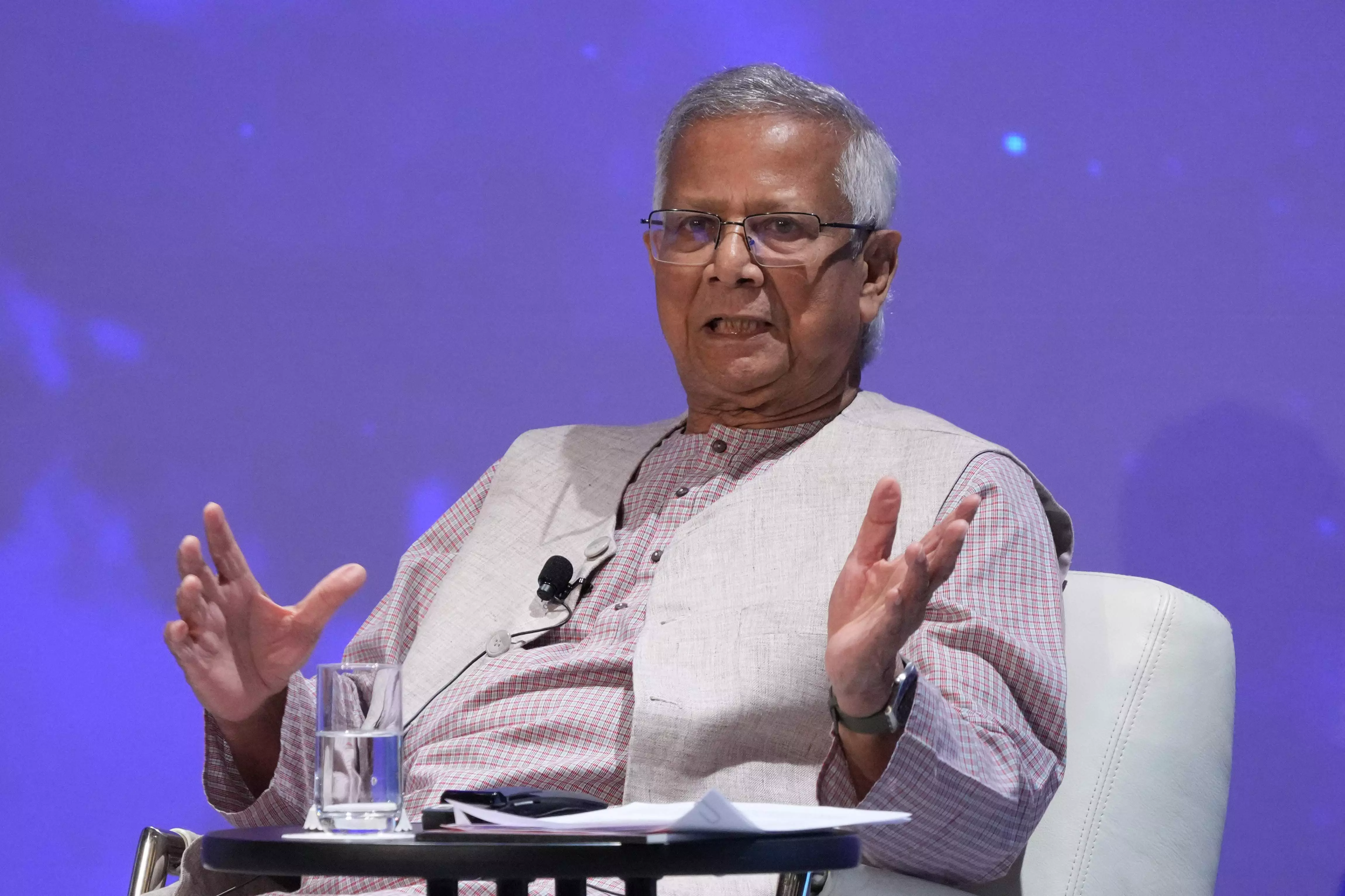Wasbir Hussain | Yunus Derails B’desh with ‘Anti-India’, Islamist Line?
The big question is: Can Muhammad Yunus hold on to power simply with his anti-India posturing and backing Islamists? The answer is a straight “no”

In his desperate bid to emerge from the political gridlock and cling on to power, Bangladesh’s interim government leader Muhammad Yunus has adopted a two-pronged strategy: whip up anti-India rhetoric and appease the Islamists in the populous nation.
Mr Yunus needs to ensure the backing of the Islamists because he faces resistance by major political forces like the Bangladesh Nationalist Party (BNP) of former Prime Minister Khaleda Zia to his deep desire to delay elections and hold on to power. Mr Yunus is also having a difficult time dealing with his Army chief, Gen. Waker-uz-Zaman, who has given the unelected regime an ultimatum to hold elections by December. And, to add to his woes, Mr Yunus also faces opposition from sections within the police and civil bureaucracy, like revenue officials, who are vehemently opposed to the regime’s plans to split the National Board of Revenue, the nation’s tax administration authority, into two. The Army is still out on the streets on policing duties as the police itself cannot be trusted to maintain order in a situation where crime is rampant. This is something the Army hates to carry on any longer, and wants to return to the barracks.
By now, we know Mr Yunus’ anti-India moves -- inviting the Chinese to expand its economy along Northeast India, seeking Beijing’s aid to rebuild the Lalmonirhat airfield near the strategic Siliguri Corridor, linking mainland India to the eight northeastern states, and keeping quiet when his backer and former Bangladesh Rifles chief Maj. Gen. A.L.M. Fazlur Rahman (Retd) suggests Dhaka should annex the Northeast Indian states if India goes to war with Pakistan. Even Mr Yunus’ own “adviser” Mahfuz Alam threatened to annex parts of India.
There are other instances too: Mr Yunus remained tight-lipped when his law adviser Asif Nazrul, in October 2024, warned that if New Delhi refused to extradite Sheikh Hasina, Bangladesh would launch a “strong protest”. Bangladesh’s unelected leader also unsuccessfully tried to ban the export of hilsa fish to India. The export of hilsa was officially banned, but the order was revoked two weeks later due to pressure from exporters as the quantity involved was big – 5,000 tonnes annually.
The big question is: Can Muhammad Yunus hold on to power simply with his anti-India posturing and backing Islamists? The answer is a straight “no”. He has tried to please the Islamists enough -- first by revoking the ban on the radical outfit Jamaat-e-Islami. The interim administration then freed from detention the leader of the radical terror group Ansarullah Bangla Team (ABT), Muhammad Jasimuddin Rahmani. And, early on, after he was installed in Dhaka on August 8, 2024, three days after Sheikh Hasina’s escape to India, Team Yunus deliberately downplayed the mob attacks on the minority Hindus across Bangladesh that went on for weeks, and is still going on, off and on.
Many would like to dismiss Mr Yunus’ talk of resigning two weeks ago as drama. But the thought of quitting came, in all probability, due to his frustration over the lack of unity in the transitional set-up itself, apart from pressure from parties like the BNP. After Mr Yunus and his administration banned the Awami League, the party to reckon with has turned out to be the BNP. Mr Yunus’ challenge now is to bring the BNP and the nascent National Citizen Party (NCP) on the same page on the election schedule. The NCP, floated by a section of students who spearheaded the July “revolution” that led to Hasina’s exit and Mr Yunus’ installation in Dhaka, wants reforms first and elections later. But the BNP wants early elections and seeks the removal of several so-called students who have bagged plum posts in the interim government. The BNP also wants the sacking of national security adviser Khalilur Rahman, who some say is an American citizen. Whether Mr Yunus’ promise to hold elections between December and June 2026 will be accepted eventually by all stakeholders remains to be seen.
What kind of a government could Bangladesh have as and when the elections are held?
Considering that there will be three major forces in the fray -- BNP, NCP and Jamaat-e-Islami -- one can see a Islamist-leaning, pro-China government emerging in the country.
But how will this help the United States is something that is yet to be seen, because Mr Yunus is seen by many as an American asset in Bangladesh. The Awami League’s future is uncertain as one of the agendas of the Yunus-led interim government is the so-called “trial” of Awami League leaders who were accused of corruption during the Hasina regime and killing opponents and other crimes during the July “revolution”.
New Delhi has reasons to be concerned over the developments and the possibilities in Bangladesh. Mr Yunus may eventually go, but Bangladesh may come under the grip of a pro-Chinese and Islamist-ideology driven political dispensation that may alter the geo-political dynamics in the region. China has intensified engagement with political parties from Bangladesh like the BNP and Jamaat. In fact, both BNP and Jamaat teams have been hosted by Beijing in recent months. Besides, China’s status as Bangladesh’s largest trading partner, with bilateral trade pegged at $24 billion, and the fact that China supplies over 70 per cent of Bangladesh’s military hardware, including artillery, tanks and submarines, indicates Beijing’s leverage over Dhaka.
Is Bangladesh heading for chaos in the days ahead? Well, if the elections are delayed beyond June 2026, Bangladesh will be headed for a total chaos. Now, the NCP wants drastic reforms, including a new constitution. If the NCP and Islamists like the Jamaat get together and make up their mind on a new constitution and take to the streets, the elections will be delayed for sure. After all, the NCP-Jamaat type of political forces in Bangladesh would like the nation to be a theocratic state. After years of being sidelined, Khaleda Zia’s BNP, on its part, is getting impatient to contest the polls because they see a chance of coming back to power in the Awami League’s absence.
Mr Yunus should know the writing on the wall. His mandate has been to set Bangladesh in order and ensure a free and fair election. Inflation is at an all-time high of 11.38 per cent and GDP growth has been just 1.8 per cent in Q4 2024. Besides, Bangladesh is faced with dwindling foreign reserves. The IMF has come to Dhaka’s rescue with a $4.7 billion loan. Can the economist in Mr Yunus rise to the occasion and in his current role as a politician rescue Bangladesh from disaster? That’s the big question.
